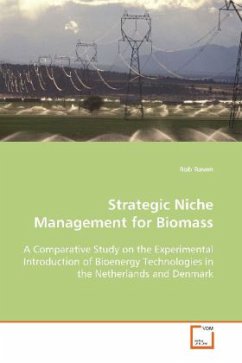This book is about the experimental introduction of
bioenergy technologies in society. It investigates
why some countries are more successful than others.
The book draws on Strategic Niche Management (SNM) to
investigate the differences between the Netherlands
and Denmark. SNM is a research and policy strategy
based on evolutionary theories of technological
change and technology assessment approaches. It deals
with experimentation in niches as a mechanism in
transitions to sustainability. This research makes
two contributions to SNM. First, it shows how
(protected) technological niches transform into
market niches. Second, it enhances SNM by integrating
the dynamics of incumbent regimes in explaining the
success of sustainable innovations. Strategic Niche
Management for Biomass combines empirical research
with recent insights from innovation studies. It is
relevant for those involved in the promotion of
sustainable innovationsthrough experimentation as
well as scholars interested in bioenergy technologies
and renewable energy in general. This may include a
broad audience such as policy makers, scientists,
corporate managers, and environmentalists.
bioenergy technologies in society. It investigates
why some countries are more successful than others.
The book draws on Strategic Niche Management (SNM) to
investigate the differences between the Netherlands
and Denmark. SNM is a research and policy strategy
based on evolutionary theories of technological
change and technology assessment approaches. It deals
with experimentation in niches as a mechanism in
transitions to sustainability. This research makes
two contributions to SNM. First, it shows how
(protected) technological niches transform into
market niches. Second, it enhances SNM by integrating
the dynamics of incumbent regimes in explaining the
success of sustainable innovations. Strategic Niche
Management for Biomass combines empirical research
with recent insights from innovation studies. It is
relevant for those involved in the promotion of
sustainable innovationsthrough experimentation as
well as scholars interested in bioenergy technologies
and renewable energy in general. This may include a
broad audience such as policy makers, scientists,
corporate managers, and environmentalists.








